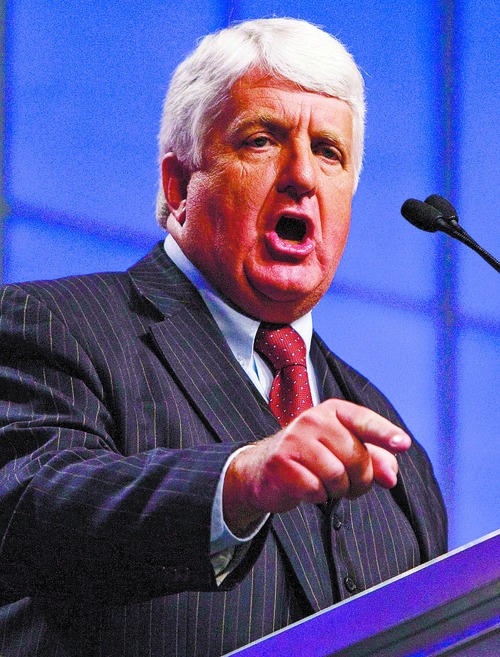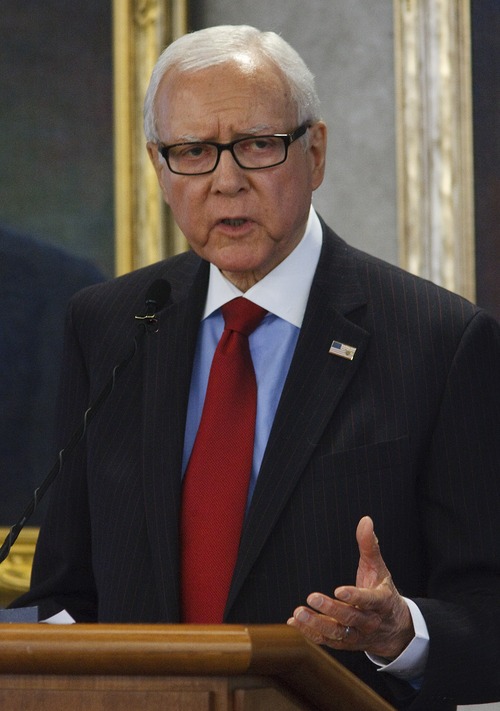This is an archived article that was published on sltrib.com in 2013, and information in the article may be outdated. It is provided only for personal research purposes and may not be reprinted.
Washington • Sen. Orrin Hatch is now Utah's only member of Congress undecided on whether the United States should attack Syria on allegations it used chemical weapons.
The state's other two fence sitters — GOP Reps. Rob Bishop and Chris Stewart — announced Monday that they are leaning against the resolution. Their skepticism added to the growing opposition to military action that prompted even President Barack Obama to express a lack of confidence in winning congressional approval.
Sen. Mike Lee and Reps. Jason Chaffetz and Jim Matheson have already made their reservations known about the plan to use targeted missile strikes to degrade Syria's ability to launch chemical weapons attacks.
Stewart withheld any statements until he could return to Washington and attend a classified briefing Monday, led by Secretary of State John Kerry. Afterward, he released a statement saying: "I have decided against authorizing military strikes in Syria. I will be encouraging others to join me in this vote."
He said that before he would support military intervention, the public would have to back the plan, it would have to be clearly in the national interest and he would have to have faith in the president's ability to lead during the conflict.
"I do not believe that any of these thresholds have been met," said Stewart, a freshmen House member and a former U.S. Air Force pilot.
Utah's other members have largely questioned the impact a limited engagement would have in the brutal civil war and they have worried that it may trigger a larger conflict just as likely as it would stop Syrian President Bashar Assad from using poisonous gas against his people again.
Obama has argued that if the United States and the international community fail to respond to the alleged Sarin gas strike that killed more than 1,000 people that it will only result in further uses of chemical weapons. And he is convinced that a short strike, using Tomahawk missiles, would be an effective deterrent that wouldn't mire the United States in another protracted war in the Middle East.
His staff argues that members of Congress must answer this question: "Should there be consequences for a dictator who uses chemical weapons against innocent civilians, including children?"
Hatch, in a brief interview with The Salt Lake Tribune, would not betray any leanings, only saying: "I'm undecided right now. I have feelings both ways."
The senator wrote an editorial published by Politico that advocated for a more robust Middle East policy that uses Syria as part of an attempt to encourage Arab Spring democracies and an economic resurgence in the area.
"Yes, we should deter another Syrian chemical weapons attack, but more is at stake," he wrote. "A wise regional strategy should reduce the risk of a regional conflagration and initiate a Middle Eastern economic renaissance. We owe it to the 6,000 American soldiers who have died in this region since 9/11."
While Hatch argued that it's "a mistake to see the Syrian crisis too narrowly," the White House was trying to make it as narrow as possible.
White House Deputy Press Secretary Josh Earnest told a group of newspaper reporters: "Our involvement is limited specifically to deter the future use of chemical weapons and degrade the Assad regime's ability to carry out attacks using chemical weapons."
In a flurry of interviews with national TV anchors, Obama hinted at a possible diplomatic solution. Syrian leaders said they were willing to consider a Russian proposal to turn over their chemical weapons stockpile if the United States would stand down.
Still, the White House wants congressional approval to strike Syria, arguing this potential breakthrough wouldn't have happened without the threat of an impending U.S. attack. Obama is expected to make that case in a nationally televised address Tuesday evening.
But he also told NBC News' Savannah Gunthrie that he "wouldn't say he was confident" about his chances in Congress and for good reason. A Washington Post tally shows 240 House members are opposed or leaning against the resolution. It would take 217 votes to block the measure.
Twitter: @mattcanham





